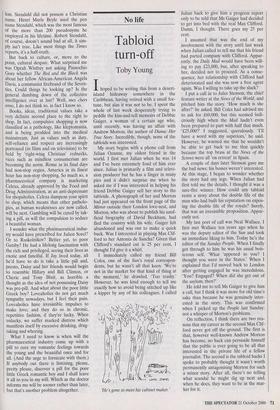No life
Tabloid turn-off
Toby Young
Ihoped to be writing this from a desert- island hideaway somewhere in the Caribbean, having retired with a small for- tune, but alas it was not to be. I spent the whole of last week desperately trying to peddle the kiss-and-tell memoirs of Debbie Gaiger, a woman of a certain age who, until recently, was having an affair with Andrew Morton, the author of Diana: Her True Story. Incredibly, though, none of the tabloids was interested.
My story begins with a phone call from Julian Ozanne, my oldest friend in the world. I first met Julian when he was 14 and I've been extremely fond of him ever since. Julian is primarily a film and televi- sion producer but he has a finger in many pies and it didn't surprise me when he asked me if I was interested in helping his friend Debbie Gaiger sell her story to the tabloids. A photograph of her and Morton had just appeared on the front page of the Mirror outside their London love-nest, and Morton, who was about to publish his unof- ficial biography of David Beckham, had fled the country with his wife. Gaiger felt abandoned and was out to make a quick buck. Was I interested in playing Max Clif- ford to her Antonia de Sancha? Given that Clifford's standard cut is 25 per cent, I thought I'd give it a whirl.
I immediately called my friend Bill Coles, one of the Sun's royal correspon- dents, but he wasn't all that keen. 'We're not in the market for that kind of thing at the moment,' he drawled. 'Too trashy.' However, he was kind enough to tell me exactly how to avoid being stitched up like a kipper by any of his colleagues. I called `He's gone to meet his cabinet maker.' Julian back to give him a progress report only to be told that Ms Gaiger had decided to get into bed with the real Max Clifford. Damn, I thought. There goes my 25 per cent.
I assumed that was the end of my involvement with the story until last week when Julian called to tell me that his friend had parted company with Clifford. Appar- ently, the Daily Mail would have been will- ing to pay £25,000, but, after speaking to her, decided not to proceed. As a conse- quence, her relationship with Clifford had deteriorated and she was now a free agent again. Was I willing to take up the slack?
I put a call in to Jules Stenson, the chief feature writer at the News of the World, and pitched him the story. 'How much is she after?' he asked. Bill Coles had advised me to ask for £60,000, but this seemed ludi- crously high when the Mail hadn't even been prepared to part with half that much. 125,000?' I suggested, querulously. 'I'll have a word with my superiors,' he said. However, he warned me that he wouldn't be able to get back to me that quickly because the top brass at the News of the Screws were all 'on retreat' in Spain.
A couple of days later Stenson gave me the bad news: his bosses weren't interested. At this stage, I began to wonder whether the story had any legs. When Julian had first told me the details, I thought it was a sure-fire winner. How could any tabloid resist a story about the double life of the man who had built his reputation on expos- ing the double life of the royals? Surely, that was an irresistible proposition. Appar- ently not.
My last port of call was Neal Wallace. I first met Wallace ten years ago when he was the deputy editor of the Sun and took an immediate liking to him. Today he's the editor of the Sunday People. When I finally got through to him he was his usual bois- terous self. 'What 'appened to you? I thought you were in the States.' When I explained that I'd moved back to London after getting engaged he was incredulous. `You? Engaged? When did she get out of the asylum, then?'
He told me to tell Ms Gaiger to give him a call, but I think it was more for old time's sake than because he was genuinely inter- ested in the story. This was confirmed when I picked up the People last Sunday: not a whisper of Morton's problems.
On reflection, I think there are two rea- sons that my career as the second Max Clif- ford never got off the ground. The first is that, however well-known Andrew Morton has become, no hack can persuade himself that the public is ever going to be all that interested in the private life of a fellow journalist. The second is the tabloid hacks I spoke to probably thought it wasn't worth permanently antagonising Morton for such a minor story. After all, there's no telling what scandal he might dig up next and, when he does, they want to be in the mar- ket for it.

























































































 Previous page
Previous page